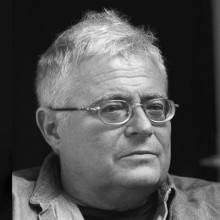Polish literature

Janusz Szuber
Born in 1947 in Sanok; a poet. He studied Polish philology at Warsaw University. For over twenty years he wrote strictly for himself, while wrestling with a disease. He made his debut in 1994 as a mature poet, with a honed literary craft. “He made his introduction with five volumes of poetry all at once,” wrote Jacek Łukasiewicz. “And that was him – Janusz Szuber, poet.” From then on he systematically published poems – first the ones he had collected over the years, then new ones, regularly, at the pace they were written.
The space of Janusz Szuber’s poetry is an extremely varied landscape, both existing in time and outside of it, and very populous. The poet speaks of it with his own crystallized diction, constantly testing the applicability of his tools. If at times the voices of the great poets resound alongside his own, above all those of Miłosz, Herbert, and Iwaszkiewicz, these are conscious references and meant to be recognized.
Tomasz Cieślak-Sokołowski called Czerteż one of the most important volumes of poetry published at the beginning of the 21st century. Taking a breather from Czerteż, the author said, he wrote An Inscription to the Books of Eternity (WL Publishers, 2009), a volume where the poet takes on places occupied by philosophers, holding discourse with Heidegger, Wittgenstein, and Ricoeur. Szuber’s Inscription to the Books of Eternity is worth comparing to Paul Ricoeur’s Living Till Death, published almost concurrently.
Janusz Szuber’s poetry demonstrates lyrical virtuosity, and is a testimony to careful observation. The element of the story is tamed with a form honed over years, it is channeled and forced to submit. The books have a fine, sometimes nearly symmetrical composition, with complementary texts neighboring one another. Alongside new poems you might find ones dated 20 or 30 years ago, which are being published for the first time. Every detail is significant: dates, dedications, allusions, contexts, styles, and references to the classics.
Life is a metaphysical trap, says the poet, though he puts this statement in ironical parentheses. Like it or not, we are in the here and now, thrown into the world, left to grapple with our existences. We are in speech – it is speech, supported by the mechanism of memory, that provides some kind of guarantee of our identity. A delusional guarantee, but it is the best we’ve got. Form fails us – it must be kept under control, polished. The “new” is a challenge for the old education, there is no way to evade its commotion, and it won’t do to pretend you weren’t born in this epoch. Grammar undermines the notion of identity, providing a rich spectrum of pronouns, though “he-they,” and thus “I” as well, exist “not just in grammar,” but are submerged in the “archive of the body.” How do we exist? Perhaps it’s not certain that we do...
In spite of the fundamental, generally vital and timeless questions put forward in this author’s books, he always keeps his distance from himself, what he does, and what is happening around him. He asks questions, but avoids a didactic tone. Each of us is ultimately here, in the trap now, outside of which is “nothing, in its pure, metaphysical and chemical forms all at once.”
Janusz Szuber has published his works in Tygodnik Powszechny, Kultura, Więzi, Twórczość, Odra, Zeszyty Literackie, The New Yorker, Poetry, La Poligrapfe, Books in Canada, and Die Horen. His poems have been translated into English, French, German, Ukrainian, Spanish, Italian, Russian, Serbian and Portuguese. In the United States thirty-three of the writer’s poems have appeared in literary publications, and in June 2009 New York’s Alfred A. Knopf, one of the oldest and most prestigious American publishing houses, published a selection of Szuber’s work, entitled They Carry a Promise, translated by Ewa Hryniewicz-Yarbrough. At the end of 2009 a selection of his works appeared in Serbian, translated by Biserka Rajčič.
Szuber has won literary awards as well, including those from the Cultural Foundation, the Kazimiera Iłłakowiczówna Poetry Award, and the Władysław and Nella Turzański Foundation Award. He is also a member of the Association of Polish Writers and the PEN Club.
BIBLIOGRAPHY
- Paradne ubranko i inne wiersze, Sanok 1995
- Apokryfy i epitafia sanockie, Sanok 1995
- Pan Dymiącego Zwierciadła, Sanok 1996
- Gorzkie prowincje, Sanok 1996
- Srebrnopióre ogrody, Sanok 1996
- Śniąc siebie w obcym domu, wyd. Muzeum Historyczne, Sanok 1997
- Biedronka na śniegu, wyd. a5, Kraków 1999
- 7 wierszy/ 7 Gedichte, tłum. S. Huber, MBP, Sanok 1999
- O chłopcu mieszającym powidła: wiersze wybrane, wyd. Znak, Kraków 1999
- Z żółtego metalu, Księgarnia Akademicka, Kraków 2000
- 19 wierszy, Lesko 2000
- Okrągłe oko pogody, Wydawnictwo Literackie, Kraków 2000
- Las w lustrach/ Forest in the Mirrors, tłum. E. Hryniewicz-Yarbrough, C. Cavanagh, il. H. Waniek, wyd. YES, Rzeszów 2001
- Lekcja Tejrezjasza i inne wiersze wybrane, Wydawnictwo Literackie, Kraków 2003 Glina, ogień, popiół, Sanok 2003
- Glina, ogień, popiół, wyd. Mordellus Press, Berlin/Toronto 2004 (Bibliofilska seria poetycka Polskiego Funduszu Wydawniczego w Kanadzie)
- Tam, gdzie niedźwiedzie piwo warzą, wyd. Bosz, Olszanica 2004
- Mojość, MBP, Sanok 2005
- Czerteż, Wydawnictwo Literackie, Kraków 2006
- Pianie kogutów: wiersze wybrane, Znak, Kraków 2008
- Wpis do ksiąg wieczystych, Wydawnictwo Literackie, Kraków 2009
- Wyżej, niżej, już, Tyczyn: Podkarpacki Instytut Książki i Marketingu, 2010
- Powiedzieć. Cokolwiek, Kraków; Wydawnictwo Literackie, 2011
TRANSLATIONS
English:
- They carry a promise. Selected poems, trans. Ewa Hryniewicz-Yarbrough, New York: Alfred A. Knopf, 2009